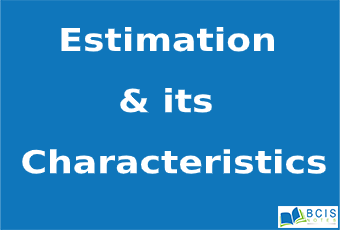
Estimation
The statistical method of estimating population parameters from the sample observation drawn from the population is called estimation. The estimation of the population parameter can be done in either of the following two ways:
1. Point estimation
If a single value of sample statistics is used to estimate the true value of the population parameter then the estimation is known as point estimation.
e.g. (a) the average height of Nepalese is 5.2 ft. (b) the average time that children spend watching television 22 hours per week.
2. Interval estimation
If the population parameter is estimated by giving a certain range within which the true value of population parameters lies with a certain degree of confidence then such estimation is called interval estimation.
e.g. the average height of Nepalese is 4.9 ft to 5.3 ft.
Characteristic/Requirement/Criteria of good estimation:
A good estimator is one that is close to the true value of the population parameter as much as possible. A good estimator has the following four parameters.
1. Unbiasedness
Let tn be the sample statistics based on ‘n’ sample observations x1, x2,… ….xn. Then tn is said to be an unbiased estimator of population parameter θ if E(tn) = θ.
If E(tn) > θ then tn is said to be positively biased.
If E(tn) > θ then tn is said to be negatively biased.
Then, the amount of biasedness is given by b(tn, θ) = | E(tn) – θ|
2. Consistency
Let tn be the sample statistics based on ‘n’ sample observations x1, x2,… ….xn. Then tn is said to be consistent estimator of population parameter θ if.
OR,
Where € is a very small positive quantity.
3. Efficiency
Let t1 and t2 are two consistent estimators of a population parameter θ such that var (t1) < var (t2) for all n. Then, t1 is said to be more efficient than t2. In other words, an estimator with lesser variance is the more efficient estimator.
If t is the most efficient estimator of a parameter θ with variance v and t1 is any other estimator with variance v1 then the efficiency E of t1 is defined as E =
4. Sufficiency
A sample statistic is said to be sufficient estimator of population parameter if all the information about the population parameter can be obtained from that sample statistic. For example, the statistic means is use all the sample value in its computation while mean and median don’t. Hence mean is a better estimator in this case.
You may also like: Advantages and disadvantages of sampling || Estimation

Leave a Reply